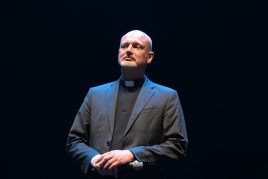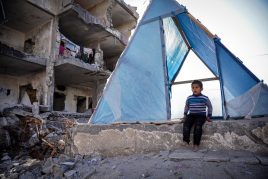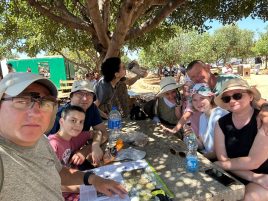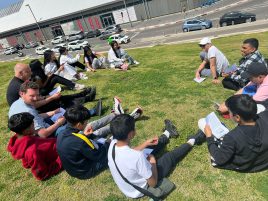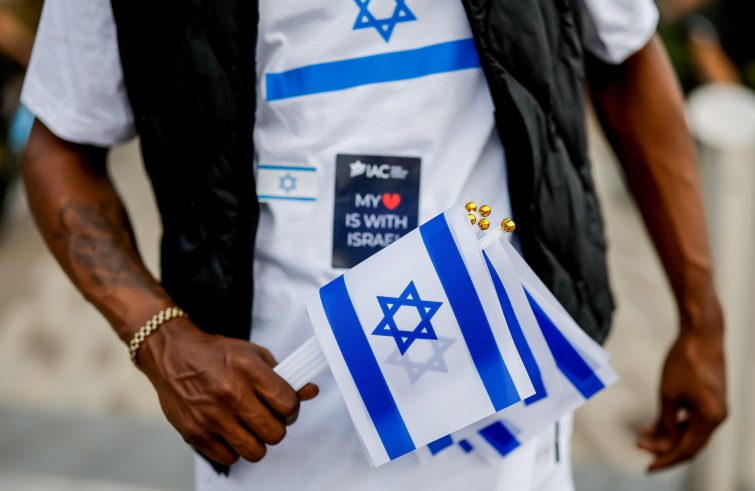
“We have been confronted with a horrendous war for 11 months now. Most of our congregants are Israeli citizens, there are children of immigrants who were born here, were raised in Israel’s cultural context and identify as Israelis. We are all shocked by what is happening.”
Speaking to SIR from Jerusalem, Father Piotr Zelazko – Patriarchal Vicar for the Saint James Vicariate for Hebrew-speaking Catholics in Israel, describes the emotional distress of his congregation, made up of about a thousand faithful spread across seven communities (Jerusalem, Haifa, Beersheva, Tel Aviv-Yaffo, Tiberias, migrant communities and Russian-speaking communities, ed. ), known as ‘kehillot’, in light of the ongoing war between Israel and Hamas and the existing tensions across Israeli society, to which they belong.
Hersh’s face. In recent days, the priest attended the funeral of young Hersh, son of Rachel Goldberg and Jon Polin, one of the six hostages killed by Hamas, whose bodies were recovered from a tunnel in Rafah. “On Thursday 5 September,” he says, “I transmitted a message of condolence from our Hebrew-speaking community to the family. It said: ‘Hersh and all the hostages were constantly in our prayers. We were hoping in their safe return home. Hersh’s untimely death has left a vacuum in our hearts, but we are comforted by our belief that he is now in the loving embrace of our Creator.”
Today, all the hostages have Hersh’s face.
“His family made appeals for his release, knocking on every door,” recalls Father Zelazko, “all over the world. I can’t imagine there was much else that could have been done. He was about to be released and instead he was killed. The feeling of impotence, of being useless, arouses a sense of anger, of revenge. These feelings destroy you inside, but then they fade away, leaving space for prayer, for entrusting oneself to God, knowing that there are still other hostages and other people afflicted by the war, for whom we continue to pray every day in our communities.” “Our Vicariate,” the priest explained, “brings together Hebrew-speaking Catholics living in Israel, members of the Jewish people and Christians from other countries, including a number of migrants and local Christians. We are united with Pope Francis, the Patriarch, his vicars, the priests and all the faithful of the Latin Patriarchate. At the same time, we feel at home in Israel’s Hebrew-speaking society.”
Heeding the cries coming from Gaza. Fr. Piotr is in constant contact with the kehillot, promoting unity and spiritual and material closeness in the face of so much violence and death. “Every day we ask ourselves if there is anything that we can do,” says the Polish-born priest, “and the answer is always the same: we can pray for peace, for the release of the hostages, for our conscripted young men, for all the families. And let us not forget those who are also suffering on the other side: mothers’ tears are all the same colour,” says Father Zelazko, echoing the words of journalist Gideon Levy, who wrote in Haaretz (5 September 2002, Ed.s note): ‘Israelis’ hearts are with the Israeli victims, it’s human. But the neglect of tens of thousands of Palestinian victims is immoral’”.
“Gaza is home to our Christian sisters and brothers. We must hear their cries. There are also innocent victims in Gaza,” said the vicar, whose commitment in favour of dialogue led him to take part on 29 November in an inter-religious event in Kfar Aza, one of the sites attacked by Hamas on 7 October, to pray together with Jews, Christians, Muslims and Druze for the victims and their families.
Anxiety about the future. “Peace and forgiveness, particularly in this context where intense feelings and emotions like those previously described are hard to manage, can be challenging to discuss,” the priest concedes. “Ultimately, we are only human. We also experience a lack of trust among members of Israeli society, we are similarly affected by these feelings.”
“What distinguishes our perspective is the message of the Gospel. It reminds us that we are all brothers and sisters, and that we must seek ways to live together without falling into a tribal mentality.” “This is the contribution that we, as Christians, can make to this society.”
In addition to prayer, “there is a need to live together in the here and now, in the family, with neighbours, and with an awareness that the world does not revolve around our own group or nation. But there’s another fear that haunts Israelis and with them the Hebrew-speaking Catholics, and that is “the fear of the future”. “Admittedly,” explains Father Piotr, “here in Israel we are somewhat used to wars. However, in my conversations with other people, I have noticed that people are uncertain about what the future has in store. No one knows how long the war in Gaza will last, whether there will be more attacks from Iran, whether the army will enter Lebanon, whether there will be more terrorist attacks.”
“Discussing the future evokes feelings of sadness and a sense of instability.”
Hope is the response of the kehillot. The kehillot have identified Pope Francis’ Bull of Indiction “Spes non confundit – Hope does not disappoint” – of the Ordinary Jubilee Year 2025, as a source of guidance in the face of uncertainty. “The pastoral year that has just begun is dedicated to hope”, states the vicar. “We are currently preparing for next year’s Jubilee pilgrimage to Rome, which we intend to undertake in August. It will provide an opportunity to reinvigorate the roots of our faith, to ‘breathe’ some fresh, new air. We are preparing to travel to Rome with a series of events, pastoral and online activities centred on Christian hope as delineated in the Bible.”
Parishes, oases of peace. For Father Piotr this too contributes to the development of the “oasis of peace that is the parish. The children who attended our summer school camps, many of whom are from immigrant backgrounds, especially Filipinos, whose mothers have lost their jobs as a result of the economic crisis, stand as testament to this.
The faithful can find refuge, material support and closeness in our communities, whatever their political convictions. Indeed, it is no coincidence that all our priests chose to stand by their communities after 7 October, despite their fears. Kehillot are islands of hope, where we pray in Hebrew, where we seek to strengthen Jewish-Christian relations, to raise awareness in the Church of our Jewish roots and of the Jewishness of Jesus and his apostles.”

